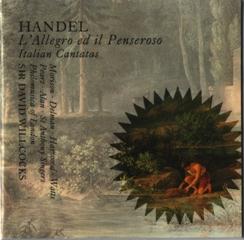Handel - L'allegro ed il Penseroso, Italian Cantatas (1992)
Handel - L'allegro ed il Penseroso, Italian Cantatas (1992)

1.L'Allegro, il Penseroso, HWV 55 (CD1 tracks 1-21. CD2 tracks 1-6.) Peter Pears (Tenor) Jacqueline Delman (Soprano) Elsie Morison (Soprano) Helen Watts (Alto) Elizabeth Harwood (Soprano) Harvey Alan (Bass) Philomusica of London, St. Anthony Singers Sir David Willcocks - conductor Italian Cantatas: 2. Splenda l'alba in oriente, HWV 166 (CD2 tracks 7-8) 3.Carco sempre di gloria, HWV 87 (CD2 tracks 9-10) 4.Tu fedel?, tu constante?, HWV 171 (CD2 tracks 11-15) Helen Watts (Alto) English Chamber Orchestra Raymond Leppard – conductor
During a bitterly cold winter in 1740 Handel settled down to write L'Allegro, il penseroso ed il moderato. L'Allegro and II penseroso were twin poems of Milton's youth and any reader for whom this poet's muse has been struck dumb by the stygian forces of 'A' levels, university entrance or degree-course dissection, should take heart from Handel's radiant responses to these poems. But they could hardly be set as they stood since the element of contrast would be severely weakened. The task of providing the composer with a suitable libretto fell to Charles Jennens who had already supplied him with one for Saul, and who was shortly to give him Messiah. Jennens alternated the two poems, using the greater part of each and in fact changing very little of Milton's text; furthermore, he added his own third part, Il moderato reflecting Augustan temper and balance, but that is not included in the present version. When this recording was first issued in 1961 it had no rivals and this was to remain so for almost 25 years until John Eliot Gardiner recorded the work for Erato. Gardiner, however included II moderato which, though poetically negligible beside Milton, contains a priceless jewel in the nature duet "As steals the morn".
Sir David Willcocks oversees an affectionate account of the piece, fragrant in its lively realization of nature images and with noble singing by Helen Watts, whose account of the air "Sometimes let gorgeous Tragedy in sceptred pall come sweeping by" shows how well she understands not only the music but also the splendour of Milton's poetry. And this leads me to another reason for considering the present issue seriously, namely its inclusion of three Italian chamber cantatas beautifully sung by Watts.
Above all, perhaps this is a precious document of singing and playing of an earlier generation, which of course has had a bearing on much that has happened since. The harpsichord continuo in L'Allegro ed il penseroso, for example is performed by Thurston Dart, whose often startlingly imaginative realizations of the figured bass, indulging in ethereal flights of fancy, are always to be savoured if not invariably applauded. The recorded sound is clear, showing little of its age and the booklet contains full texts, though Winton Dean's excellent introduction deals only with L'Allegro ed il penseroso. Decca should certainly have included at least a paragraph or two about the cantatas. This apart, a stimulating and welcome reissue. --- Gramophone [8/1993], arkivmusic.com
download (mp3 @320 kbs):
yandex 4shared mega mediafire zalivalka cloudmailru uplea
